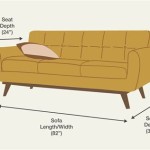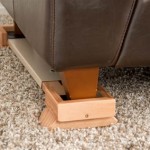Sofás Usados Para Dar (Used Sofas to Give Away)
The act of donating used furniture, particularly sofas, presents a sustainable and socially responsible approach to decluttering and supporting those in need. This practice contributes to a circular economy, reduces landfill waste, and provides essential furnishings for individuals and families facing financial hardship. Understanding the processes and considerations involved in donating a used sofa can facilitate a smooth and impactful experience for both the donor and the recipient.
Several factors should be considered before donating a used sofa. An honest assessment of the sofa's condition is crucial. Structural integrity, including the frame, springs, and cushions, should be checked. Rips, tears, stains, and signs of pet damage should be noted. While some organizations accept sofas with minor imperfections, significant damage might render the sofa unsuitable for donation.
Cleanliness is another important factor. A thorough cleaning of the sofa prior to donation is highly recommended. Vacuuming, shampooing, and spot cleaning can significantly enhance the sofa's appeal and hygiene. This simple act demonstrates respect for the recipient and increases the likelihood of the sofa finding a new home.
Knowing the dimensions of the sofa is essential for logistical purposes. Accurate measurements of length, width, and height will help determine the appropriate transportation method and ensure the sofa fits comfortably in its new location. Providing these details to the receiving organization beforehand simplifies the donation process.
Researching potential recipients is a vital step in ensuring the donation reaches those who can benefit most. Numerous organizations accept furniture donations, including charitable organizations, non-profit groups, and community centers. Some organizations specialize in supporting specific demographics, such as families transitioning from homelessness or individuals escaping domestic violence. Choosing an organization aligned with one's values can add a layer of personal meaning to the donation.
Contacting the chosen organization is necessary to arrange the donation. Many organizations have specific procedures and requirements for accepting furniture donations. Some offer pick-up services, while others require donors to transport the sofa to a designated drop-off location. Inquiring about these logistics in advance streamlines the process and prevents potential complications.
Scheduling the donation requires coordination between the donor and the receiving organization. Confirming availability and arranging a mutually convenient time for pick-up or drop-off is essential. Providing clear and concise communication regarding the sofa's location and accessibility facilitates a seamless transfer.
Preparing the sofa for transport involves ensuring easy maneuverability and minimizing the risk of damage during transit. If utilizing a pick-up service, clearing a pathway from the sofa's location to the exterior of the residence can expedite the process. If transporting the sofa personally, securing it properly in the vehicle is crucial to prevent shifting and potential damage during transit.
Understanding the tax implications of donating furniture can offer potential financial benefits. Donating to a registered charitable organization may qualify the donor for a tax deduction. Maintaining proper documentation, such as a receipt from the organization, is crucial for claiming this deduction. Consulting with a tax professional can provide personalized guidance on maximizing the tax benefits of charitable donations.
Beyond the practical considerations, donating a used sofa offers a range of benefits. Environmentally, it diverts usable furniture from landfills, reducing waste and conserving resources. Socially, it provides essential furnishings to individuals and families in need, fostering a sense of community and support. Personally, it offers a fulfilling way to declutter and give back, promoting a sense of purpose and generosity.
The increasing popularity of online platforms and social media groups dedicated to connecting donors with recipients further simplifies the process of donating used furniture. These platforms often feature dedicated sections for furniture donations, enabling donors to reach a wider audience and connect directly with individuals in their local community. Utilizing these resources can significantly increase the chances of finding a suitable recipient for a used sofa.
The decision to donate a used sofa represents a conscious choice to contribute to a more sustainable and equitable society. By carefully considering the factors outlined above, individuals can ensure their donation makes a meaningful impact on the lives of others and minimizes environmental impact. This simple act of generosity can transform a discarded piece of furniture into a valuable resource for those in need.
Finally, it is important to remember that regulations and practices surrounding furniture donations may vary depending on location and the specific organization. Checking local guidelines and communicating directly with the chosen organization is always recommended to ensure compliance and a smooth donation process. This proactive approach ensures the donation aligns with local regulations and contributes effectively to the organization's mission.

Sofás Esquineros Para Una Sala Pequeña Architectural Digest

Donde Donar Sofás Usados Lima Sofas
Sofá Usado Para Dar Silveira Olx Portugal

Estos 12 Sofás Son Tendencia De Decoración En 2024 Foto 1

Sofás Esquineros Para Una Sala Pequeña Architectural Digest

20 Ideas Para Cubrir Y Renovar Tu Viejo Sofá Guia Decoracion

Sofás Cómo Acertar Con La Compra Del Modelo Perfecto Para Tu Salón Foto 1

Cómo Elegir El Mejor Sofá Para Tu Casa Decofilia Com

Las 8 Mejores Marcas De Sofás Quedecoraciones Com

Sofás Cómo Acertar Con La Compra Del Modelo Perfecto Para Tu Salón Foto 1








